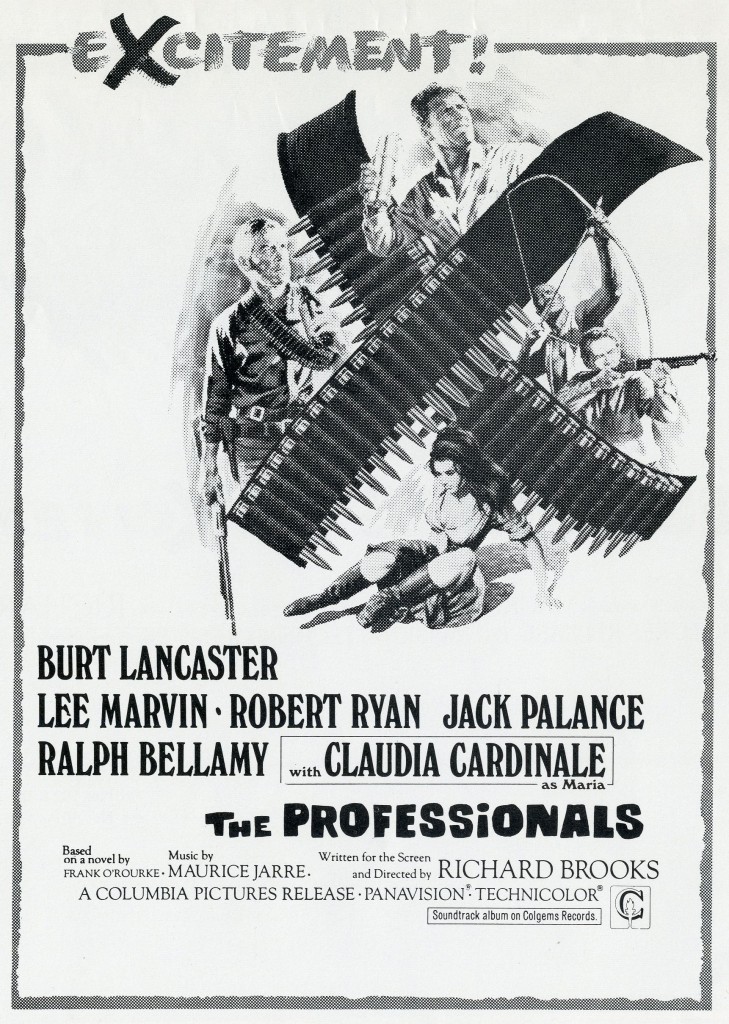 Our fifteenth choice for 2014 is the exciting action-adventure The Professionals (1966). It’s sort of a western, but set after the usual time frame of traditional westerns and then mostly in Mexico, and it’s sort of a war film, but with only a couple of big-scale battle sequences. It’s actually more of a character study, with seven sturdy major characters, plus a couple of interesting people in support. And like The Wild Bunch, which followed just three years later, it is a transition parable regarding the death of a frontier and the last hurrah of a certain breed of people who call that frontier home.
Our fifteenth choice for 2014 is the exciting action-adventure The Professionals (1966). It’s sort of a western, but set after the usual time frame of traditional westerns and then mostly in Mexico, and it’s sort of a war film, but with only a couple of big-scale battle sequences. It’s actually more of a character study, with seven sturdy major characters, plus a couple of interesting people in support. And like The Wild Bunch, which followed just three years later, it is a transition parable regarding the death of a frontier and the last hurrah of a certain breed of people who call that frontier home.
It’s a macho movie for sure, what with athletic Burt Lancaster, stoic Lee Marvin, rugged Robert Ryan and powerful Woody Strode as four mercenaries hired by rich big shot Ralph Bellamy to return his kidnapped wife (Claudia Cardinale) from Mexico. To add to the intrigue, the Mexican kidnapper (Jack Palance) is well known to both Lancaster and Marvin; however, the promise of $10,000 a man is more than enough to convince them to go after the girl, come what may. They are prepared for anything, except, perhaps, an aspect of the affair that Bellamy’s character decides not to divulge to them.
Attention must be paid early: each of the four major mercenary characters is shown in action and three of them are recruited by J. W. Grant (Ralph Bellamy) during the opening credits! The leader of the trio, Henry Rico Fardan (Lee Marvin), insists that they need “an equalizer,” someone who knows explosives, so Grant agrees to bail Bill Dolworth (Burt Lancaster) out of jail to join their cause. Grant’s proposition is simple: ride one hundred miles into Mexico to the fortified hacienda where the bandit Jesus Raza (Jack Palance) has taken Grant’s wife Maria (Claudia Cardinale), sneak in and sneak her out, and bring her back. Grant tells Fardan that it would take a month for a battalion to do the job, and Maria would probably be killed in the attempt, but four men might be able to do it safely. The weapons expert, Fardan, would lead the group, with Dolworth the dynamiter, Jacob Sharp (Woody Strode) the expert with rifle, rope and bow and arrow, and Hans Ehrengard (Robert Ryan) to take care of the horses needed to make the rugged trek across the desert. The men are reluctant, but $1000 a man, plus another $9000 per head promised upon their return, is enough to set the plan in motion.
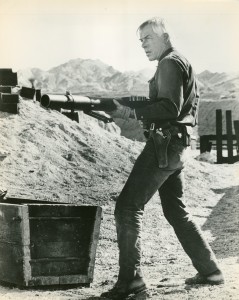
This introductory section is my favorite part of the film. Director Richard Brooks utilizes sharp, quick dialogue to broach J. W. Grant’s scheme, taking a no-nonsense approach that demands attention and creates excitement in the process. Issues are raised and addressed or dismissed, as need be, such as Fardan being asked if working with a Negro will be a problem. Fardan says nothing, then asks a question about something else and the issue is forgotten. Everything is relevant and on point. And yet, room is made for character: Grant looks at an old newspaper of Fardan (and Raza and Dolworth) and remarks, “Your hair was darker then.” Fardan smiles rather ruefully and replies “My heart was lighter then.” I love that line, so much so that I am waiting for an opportunity to use it myself. So far, that opportunity has not yet arisen.
Almost none of this preparatory period is spent with the men talking to one another. Instead they hone their weaponry, practice their skills, check their supplies, examine maps, shoe the horses and do what needs to be done. They are indeed professionals. The trek south is mostly uneventful until they near Raza’s stronghold, but it does provide moments for Fardan and Dolworth to interact a bit more, to show Ehrengard’s love for horses and to work into the story a strategy that demonstrates how a team is supposed to work together — the upside down cross. Dolworth scouts ahead; if he finds or suspects trouble, he leaves behind an upside down cross, a clue to the others to be wary and ready for action. Indeed, Dolworth’s use of the warning saves his life when he is captured by bandits and left without pants for a second time in the movie (having first lost them in the opening scene).
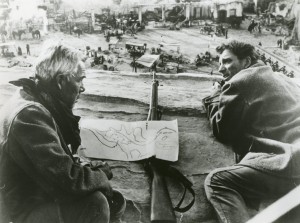
The relationship of Fardan and Dolworth is at the core of The Professionals. Fardan is steely tough, stoic and always alert; Dolworth is laid-back, usually smiling and joking, and always looking for an easy dollar. They complement each other in every way, and their trust, their bond, is essential to the story. When Bill Dolworth begins to have second thoughts about Grant’s money, thinking it would be easier to keep it and forgo the mission, Rico Fardan reminds him that Dolworth didn’t give his word to Grant to see the mission through — he gave it to Fardan. The mission continues. The men look after each other, confide and strategize together, and are willing to sacrifice themselves for the other if need be. That bond is at the core of the story, and it is what makes the whole thing work so effectively.
That is not to say that they are equals. Fardan is the unquestioned leader of the men, Dolworth simply one of the others. On the acting side of things, Lee Marvin is as commanding here as he would be in The Dirty Dozen the next year, personifying the rough-hewn officer type with precision and style. Marvin dominates his parts of the film while allowing the others space to do their thing. Burt Lancaster, on the other hand, runs wild and basically steals the picture with his charm and athletic prowess and abundance of humor. Marvin makes this a tough movie; Lancaster makes it an enjoyable one.
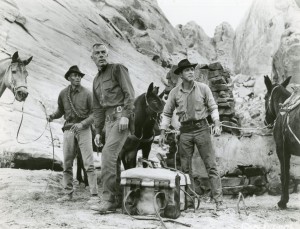
Near Raza’s hacienda things get tight for the Professionals; enemy territory means spies everywhere, few places to hide and a long way to run. An ally provides shelter and food while they run reconnaissance and prepare their attack. At night they sneak into Raza’s camp, set explosive charges, eliminate some of the perimeter guards and plan their escape route. Just before the action begins Fardan and Dolworth meet where they believe Grant’s wife to be held, only to find Raza (Jack Palance) ready to take her for himself. Their surprise intensifies when Maria (Claudia Cardinale) gladly accepts his embrace. Dolworth whispers to Fardan, “Amigo, we’ve been had!” and motions that they should get the hell out while they still can. And that’s when things begin to explode all around them.
The rescue goes off as planned, with many of Raza’s men being massacred during the firestorm, but the chase has just begun. Raza has not kidnapped Grant’s wife; Maria came of her own volition and belongs to him, body and soul. Raza will not allow these men to return her to the rich American, no matter what. The Professionals have only the supplies they can carry, plus a reluctant captive, as they trek back toward Texas across the scorching desert. Who will prevail?
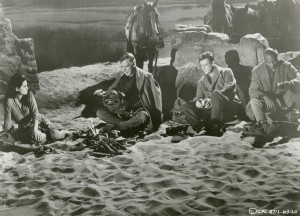
Maria demonstrates to Dolworth just why a woman might be worth Raza’s ransom demand of $100,000. She is as tough as any of the men, and more determined than all of them. She slows them down so that Raza can catch up; she tries to seduce Dolworth into setting her free; she blazes hate at the men for taking her away from the man she loves. The film takes on a different tone when Maria joins the parade, yet she is treated with utmost respect. Maria is portrayed by gorgeous Claudia Cardinale, and while her beauty seems incongruous in the barren desert, it certainly provides delightful scenery for the audience. I don’t think Cardinale has ever been as fundamentally beautiful as she is seen in The Professionals; at times she is absolutely breathtaking. And while that could certainly be a distraction from the story, and may be for some viewers, I think her beauty reinforces Raza’s — and Grant’s — desire for her, making the battle to keep her one of almost primordial import.
One thing I’ve always wondered, however, is triggered by Maria. She talks to Fardan and Dolworth about Raza and how they rode together in the Mexican revolution with Pancho Villa as if she were present. How is it that they do not know her? My guess is that Raza’s acquaintance with Maria began after their adventures with Villa in 1915, and she is talking about things Raza has told her, but it isn’t completely clear. When I watch the film, I sometimes feel that Fardan and Dolworth should already know about her from their knowledge of Raza.
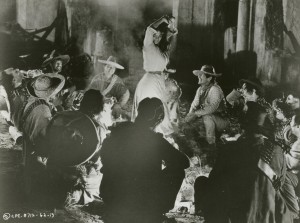
Maria isn’t the only woman of note in this story; Raza’s coterie includes a jovial woman “who never says no,” according to Dolworth, who would know. That is Chiquita (Marie Gomez), whose passion for men and excitement remains unquenched no matter how busy she keeps herself. Chiquita is also devoted to Raza and it is she who takes a huge risk when Raza’s rapidly declining army finally catches up to Dolworth at the pass. It is worth noting that Chiquita has a brief nude shot, seen by Fardan and Dolworth as she bathes standing up from afar. This was among the earliest glimpses of nudity in a mainstream American film in the mid-1960s, which was still working under the soon-to-be-jettisoned Production Code. The movie ratings system would be implemented two years later, in 1968, because barriers were being broken all over the place, and The Professionals helped hasten that evolution. Also nude in the film is Claudia Cardinale, in bed with Raza, but a curious blackened area covers her closeup toplessness. I don’t know if the blackened area, which looks like a big dark shadow centered on her chest, exists in the European release of the film.
The sequence at the pass pits Raza, his remaining compatriots, and Chiquita against Dolworth, who has stayed behind to defend while the others take Maria the rest of the way to Texas. Dolworth dynamites the pass, eliminating more of Raza’s men, but a few still survive. Raza takes this opportunity to call out to his old friend Dolworth, chide him for siding against him in this matter, and describing how Maria means more to him than anything else in the world. Dolworth listens and talks back to Raza and Chiquita, knowing that during the friendly conversation they are working to try to get past him. The showdown between them is costly for everyone.
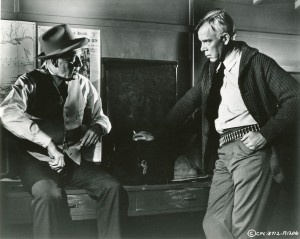
But the story cannot conclude until Maria is delivered to J. W. Grant. This occurs in Mexico, just across the border from Texas. As Fardan, Ehrengard and Sharp wait with the woman, Dolworth rides up, dusty and wounded and exhausted — with Jesus Raza in his buckboard wagon. Maria is thrilled to see her lover again, although he is badly injured. She cares for him while the men face Grant. Upon seeing Raza and Maria together, the millionaire beats Maria and wants Raza shot at once, but Fardan prevents it, preferring to listen to Grant explain himself. The upshot is that J. W. Grant, “a self-made man,” as Fardan describes him, learns that his money won’t buy everything. Fardan and his men bid farewell to the money they were promised and accompany Raza and Maria back into Mexico. It’s a hell of an ending for such an adventure, turning everything upside down and inside out. It’s not exactly satisfying, when considering all of the waste of effort and the loss of all that human and equine life that could have been avoided, but what can you do? They are absolutely right to make the call they do, choosing friendship, integrity and respect for women above money. That’s why they are the Professionals.
And that’s what makes Richard Brooks’ movie so good. These aren’t easy choices. It would be easy to make a vigilante-style movie in which the villains are unrepentant rapists and murderers and deserve divine retribution in slow-motion Technicolor. But Brooks knew that muddying the water with elements like mutual respect between adversaries, respect for women and complex moral dilemmas deepen character and sharpen plotting. It isn’t easy for Dolworth to wait at the pass, knowing the odds are against him, having to fight his old friend Raza and a woman he knows intimately, Chiquita. It isn’t easy for Fardan to turn Maria over to Grant, knowing that her heart is with Raza and all that she faces with Grant is unhappiness and pain. It isn’t easy for Ehrengard and Sharp to stand by quietly, knowing that a huge payday is being put in jeopardy because of feelings for a woman and a Mexican bandit. Yet these and other elements jell dramatically precisely because they are complex and difficult.
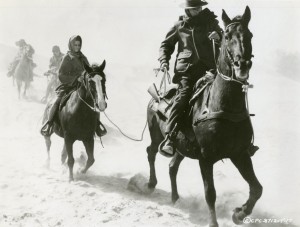
Other elements that contribute to the film’s glory are Conrad Hall’s indelible cinematography and the evocative score by Maurice Jarre. The composer, Jarre, delivered some great scores and themes throughout the 1960s, and his work on The Professionals is among his best. It’s exciting, exuberant and thrilling, just like the movie. And nobody photographed outdoor sagas like Conrad Hall. From Cool Hand Luke through In Cold Blood to Butch Cassidy and the Sundance Kid, no one was as good as Conrad Hall in his prime. The Professionals was right at the beginning of that prime, and his widescreen vistas elevate the film in a myriad of ways. The landscape comes alive in Hall’s lens, and even stock shots are composed with flair and artistry. He was certainly among the best cinematographers I’ve ever seen, and his outdoor work ranks behind no one. Hall was nominated for his second Academy Award for this film; he eventually won three Oscars.
As you can tell, I’ve always been a big fan of The Professionals. I like everyone in it, especially Lee Marvin, and I like how it is put together. It delivers sharp, stimulating, thought-provoking, slam-bang entertainment. And while it isn’t quite a masterpiece to my eyes, it is not far from that plateau. It is eminently watchable and rewarding no matter how many times you see it.
Is The Professionals a classic? Absolutely! This movie virtually defines outdoor action-adventure, and is near the pinnacle of that thrilling genre. Everything works, and the film delivers the thrills it promises, along with some biting commentary as well. It was a huge, surprising hit at the time, cementing Lee Marvin’s status as a box office draw and giving Richard Brooks (who garnered Oscar nominations for his writing and directing) the clout to tackle In Cold Blood as his next project (again with Conrad Hall as cinematographer). It predates the similar film The Wild Bunch by three years; one of the reasons Marvin didn’t accept Sam Peckinpah’s offer to lead The Wild Bunch is because he had already made this movie. It gathered acclaim from many sources and has endured in the fickle public memory for nearly half a century. It is a terrific movie and a fabulous film. ☆ ☆ ☆ 1/2. 9 November 2014.
